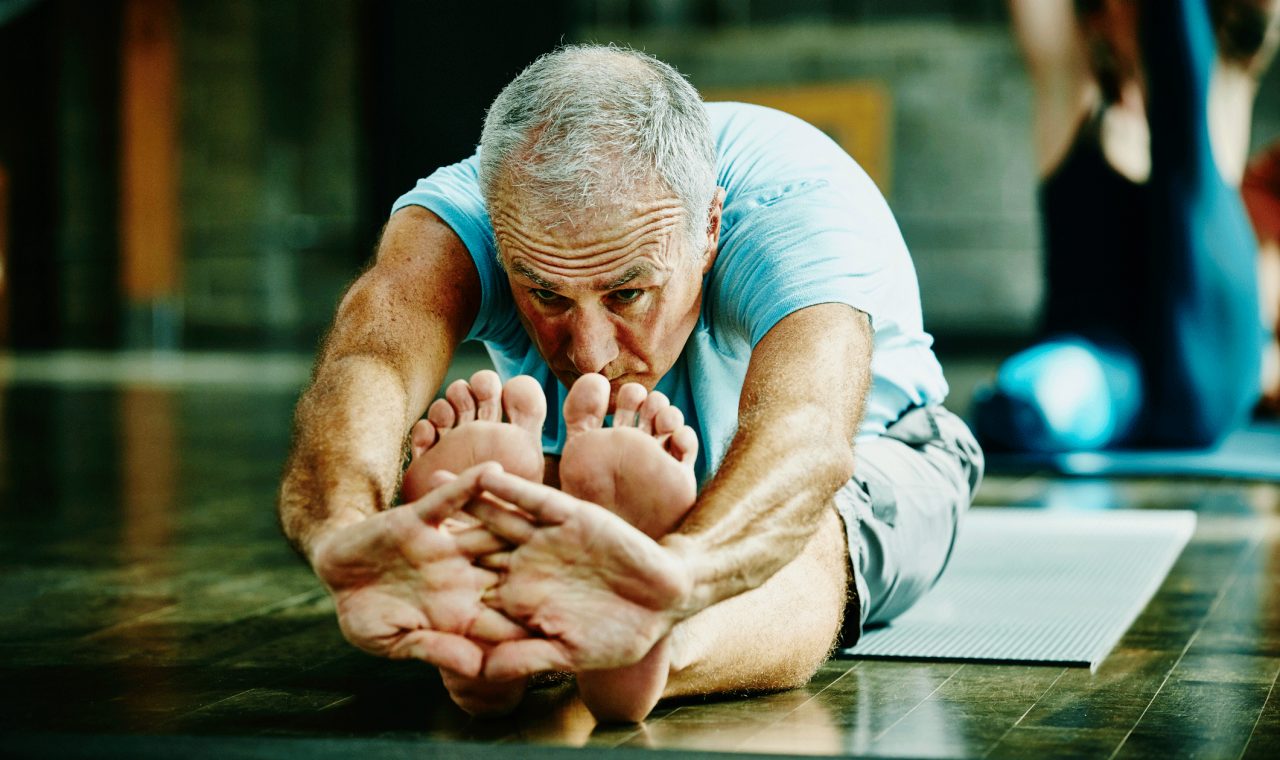Stretching Can Lower Blood Pressure

Stretching can boost flexibility and improve your range of motion. It has another surprising health benefit, too. Stretching can lower high blood pressure.
Stretching has several health benefits. It can improve your flexibility and joint range of motion, increases blood flow to muscles, and often helps relieve back pain and stiff necks. In addition, studies have shown a surprising benefit of stretching, lower blood pressure.
High blood pressure, also known as hypertension, is a potentially serious health problem, affecting about 108 million Americans. High blood pressure that’s not effectively controlled is linked to a host of serious health problems, including stroke, kidney disease, heart attacks, and vascular dementia, the National Heart Lung and Blood Institute (NHLBI) points out. Weight control, exercise, and medication, if needed, are common therapies. Now there’s more reason than ever to add daily gentle stretching to the list of ways to lower your blood pressure.
Researchers have noted stretching can lower blood pressure, and that’s one reason yoga, which incorporates poses involving stretching, helps improve blood pressure. However, University of Saskatchewan scientists have found stretching can be more effective for reducing blood pressure than previously known.
In fact, their research, published in the Journal of Physical Activity and Health, showed gentle, regular stretching was superior to brisk walking for reducing blood pressure in people with hypertension.
YOU MIGHT ALSO LIKE: Social Isolation and High Blood Pressure in Older Women
How and why stretching lowers your blood pressure
"Everyone thinks that stretching is just about stretching your muscles," explained University of Saskatchewan kinesiology professor Phil Chilibeck, PhD, who led the study.
"But when you stretch your muscles, you're also stretching all the blood vessels that feed into the muscles, including all the arteries. If you reduce the stiffness in your arteries, there's less resistance to blood flow," he added, noting that resistance to blood flow is what increases blood pressure.
To compare the impact of regular brisk walking for 30 minutes most days of the week on blood pressure versus stretching for the same amount of time, Chilibeck and his co-researchers randomly assigned 40 men and women with diagnosed stage 1 hypertension into two groups. For about two months, one group spent half an hour a day, for five days, participating in a whole-body stretching routine. The other group walked briskly for half an hour, five days each week.
Before the study began and after it was completed, Chilibeck and his research team recorded the study participants’ blood pressure while they were sitting and lying down. Each research subject also wore an ambulatory blood pressure monitor that measured and recorded their blood pressure over a 24 hour period.
The findings showed stretching resulted in significantly greater reductions in blood pressure across all three types of measurement when compared to brisk walking.
Bottom line? Don’t stop walking, but consider adding stretching to your day
The people in the study who walked did lose more body fat than those who only stretched. And cardiovascular experts have long encouraged regular physical activity to improve heart health, including getting and keeping blood pressure at a healthy level.
So, Chilibeck urges people who are walking regularly to prevent or reduce high blood pressure to keep it up. But he advises adding stretching sessions, too.
"I don't want people to come away from our research thinking they shouldn't be doing some form of aerobic activity. Things like walking, biking, or cross-country skiing all have a positive effect on body fat, cholesterol levels, and blood sugar,” Chilibeck said.
Although the University of Saskatchewan study involved 30 minutes of stretching at a time, Chilibeck suggests a shorter stretching routine emphasizing large muscle groups in the legs would likely bring the same benefits — and practicing yoga regularly also typically produces a similar lowering of blood pressure
Stretching is easy to incorporate into your life and to perform in your home, he added. It’s also easy on joints and doesn’t take a great deal of time.
"When you're relaxing in the evening, instead of just sitting on the couch, you can get down on the floor and stretch while you're watching TV," Chilibeck said.
Updated:
September 17, 2021
Reviewed By:
Janet O'Dell, RN